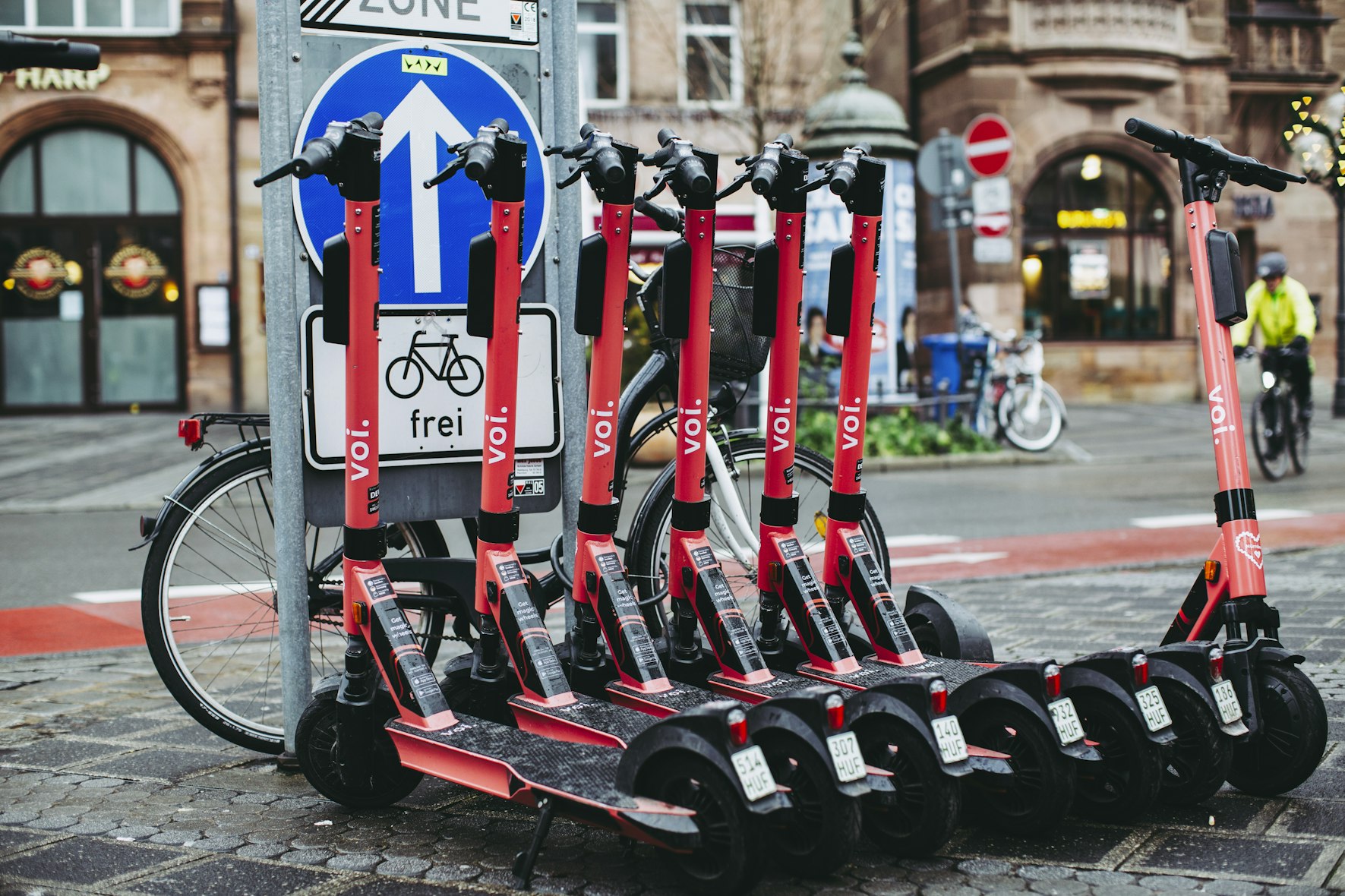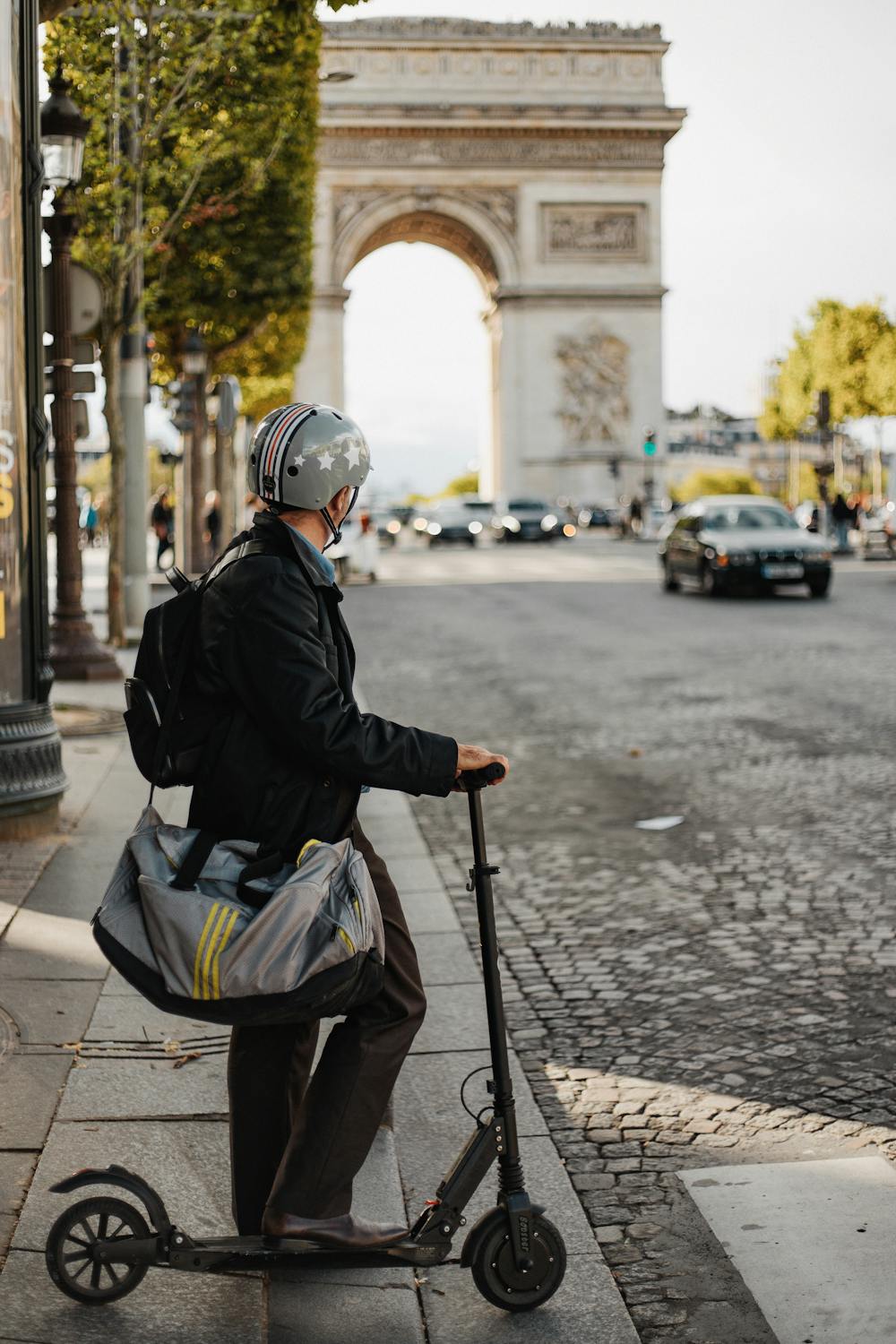On September 1st, 2023, Paris made history as the inaugural European capital to enact a street ban on electric scooters, eliciting disappointment from avid supporters and providing relief to critics who have long found the presence of e-scooters vexing and bothersome. This marked a significant departure from its initial embrace of eco-friendly modes of transportation five years ago.
Electric scooters, often called e-scooters, are motorized scooters with electric motors and battery-powered wheels. They have gained popularity in France as an eco-conscious and convenient urban transportation mode, with numerous cities witnessing increased usage.
This article explores the environmental benefits and various advantages of e-scooters, their legal status worldwide, the reasons behind France’s ban, and alternative solutions to banning them.

Modern urban e-mobility scooter
Source: Unsplash
Benefits of E-Scooters
1. Ecofriendly
E-scooters offer eco-friendly urban transportation. They are compact, maneuverable, and cost-effective, running solely on electricity, reducing emissions and transportation costs compared to cars and motorcycles, making them a sustainable choice.
2. Health Benefits
They are both cost-effective and health-promoting, enhancing cardiovascular fitness and reducing your carbon footprint. They offer a delightful commuting and neighborhood exploration experience, ideal for short-distance trips, making them practical for urban residents.
3. Sustainability
Additionally, their ease of parking, quiet operation, portability, and the availability of customizable options further enhance their appeal as a versatile and sustainable urban mobility solution.
Global legal status of e-scooters
E-scooter regulations vary worldwide due to diverse regulations, ranging from public road permission to private property restriction, with speed, weight, and age rules in place.
1. United States: In the USA, e-scooter regulations vary – allowed on roads in some places, confined to paths or sidewalks in others. Regional variations also affect age and helmet requirements.
2. Europe: European e-scooter regulations define rules on speed, age, and helmets in some countries. Certain European cities ban sidewalk use, requiring e-scooters on roads or in bike lanes.
3. Middle East and Africa: E-scooter regulations are evolving in these countries, with permission in some cities and prohibition or lack of regulation in countries like Dubai, Riyadh & Cape Town.
4. India: E-scooters find legal acceptance on public roads in India. Nevertheless, the operational framework entails a spectrum of regulations, including speed restrictions and helmet mandates.
The E-Scooter Ban in France
Naturally, a question emerges: If e-scooters offer numerous benefits, what led to their ban in France? The ban was a result of increasing injuries and three fatalities related to their use. In April, data from the Paris mayor’s office revealed that approximately 90 percent of the votes cast in a citywide referendum favored the ban. Private vehicle use in Paris remains unaffected; the ban applies solely to rental E-scooters provided by various companies since 2018.
These two-wheeled vehicles had, unfortunately, become a source of annoyance for many Parisians with complaints about riders on sidewalks and haphazardly parked scooters. Their rapid proliferation raised concerns about safety, traffic, and urban quality of life. Around 15,000 rental e-scooters from Tier, Lime, and Dott, available via a mobile app, have stirred controversy. Locals are concerned about their effects, including street congestion, sidewalk obstruction, and pedestrian safety hazards.
To address these issues, e-scooter rental companies propose age verification checks (minimum age 18) and license plates. The city has enacted regulations to tackle these problems, including bans on mobile devices, headphones, and pavement riding. Speed limits are enforced in specific zones, with fines of up to €1,500 for violations. Despite these efforts, the city still faces e-scooter-related challenges.
While environmentally beneficial, e-scooters raised safety concerns. A 2019 JAMA Surgery study noted a significant rise in e-scooter injuries, including fractures and head injuries, in the United States, potentially relevant to France’s reported injury concerns.

E-scooters on the streets of the City of Lights
Source: Pexels
Comprehensive Approaches to E-Scooter Safety
The ban mainly impacts e-scooters in the capital, not the suburbs where rentals may continue. Instead of a total ban, a comprehensive approach including laws, awareness, and infrastructure improvements can address e-scooter safety, with these alternatives to reduce risks:
1. Promoting responsible riding
Implementing a rewards and fines strategy can promote responsible behavior. For example, offering rewards for adhering to safety regulations and proper e-scooter parking.
2. Regular Upkeep and Inspection
Mandating regular maintenance checks for e-scooters and setting up reporting systems for damage will ensure fleet safety and prompt resolutions.
3. Better Infrastructure
Developing dedicated e-scooter lanes & parking areas and enhancing road infrastructure will ensure safe and separate e-scooter mobility while minimizing disruptions to pedestrians and vehicles.
4. Laws and their Enforcement
Enforce strict e-scooter speed limits, particularly in crowded areas and sidewalks, and impose fines for violations, including improper parking and helmet non-compliance.
5. Safety Understanding and Education
Implement mandatory e-scooter rider safety training, emphasizing proper riding, traffic laws, and helmet use. Launch public awareness campaigns to educate both motorists and pedestrians about safe coexistence with e-scooters.

E-scooters have become a safety hazard.
Source: Unsplash
Paris’s e-scooter ban has stirred debate about sustainable urban mobility. Despite their benefits, safety concerns and urban impacts prompted the prohibition. Achieving a balanced approach to maximize benefits while minimizing risks is a key task for urban planners and policymakers.
If you enjoyed reading this post, please subscribe to our newsletter or Visit our Shop to buy geeky science merchandise.


